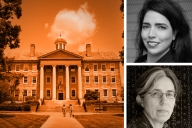You have /5 articles left.
Sign up for a free account or log in.

iStock
Faculty leaders at the University of Illinois at Urbana-Champaign are weighing a proposal to protect faculty members from students who enroll in their classes to disrupt, or troll, them.
That Faculty Senate resolution is a watered-down version of an earlier proposal that would have let professors, via their departments, pre-emptively ban harassers -- whether the harassment was in person or online.
The earlier proposal was put forth by Jay Rosenstein, a professor of media and cinema studies and Senate member. Rosenstein is a vocal opponent of Native American mascots and has clashed with some on campus who continue to dress as Illinois’s own former mascot, Chief Illiniwek, at sporting events. Illiniwek supporters also have targeted him on social media.
Via email, Rosenstein said Monday that a local person “who is a dedicated political opponent of mine” enrolled in the university as a non-degree student “exclusively to be able to register for my class.” The person, whom Rosenstein did not name, already had been "harassing me by posting disparaging lies and many false accusations about me continuously for nearly a year," and even showed up at Senate meetings to malign him, he said.
Rosenstein said the person admitted to wanting to see what he was teaching, as "they believed I was 'indoctrinating students with hate.’” But when Rosenstein tried to get the person removed from class, he "found there was no policy to do that.”
In an effort to prevent similar incidents going forward, Rosenstein said he pitched a policy that would allow a department to keep a student from registering for a class taught by a particular faculty member, if that student had a history of harassing, stalking or trolling that professor -- except if the class was necessary to graduate and the professor was the only instructor.
“I thought this was a reasonable, common-sense policy to protect faculty who have been targeted by harassment campaigns,” he said.
Professors on other campuses have faced harassment and online trolling in relation to their views or public statements. Many have gotten a negative publicity boost from websites that track supposedly radical professors. Among them is Rochelle Gutierrez, a professor of curriculum and instruction at Illinois who has faced personal attacks online for her work arguing that traditional math pedagogy disadvantages students of color.
Nationally, many professors who say they've been the target of malicious online campaigns are scholars of gender or ethnic studies, or who take positions related to gender, race and sexual orientation.
Echoing other scholars' demands that colleges and universities do more for professors facing backlash for the public outreach institutions say they value, Rosenstein’s resolution also said cyberstalking and cyberbullying “are not yet comprehensively or fully addressed by university policies and procedures.”
The proposal went before Illinois’s full Senate last term. But after lengthy debate, it was ultimately referred to a university policy committee led by Nicholas C. Burbules, the Edward William and Jane Marr Gutgsell Professor in educational policy, organization and leadership, for further review. (Burbules has also contributed opinion pieces to Inside Higher Ed.)
That committee determined that Rosenstein’s resolution addressed disparate issues, and that it wanted to focus on the question of classroom disruption. That's according to a memo it sent to the Senate’s executive committee last week. And while there are already “considerable options and support resources for such a situation,” it said, they’re “dispersed and not readily available.”
Burbules’s committee gathered Illinois’s existing policies and resources on classroom disruptions. If gaps in protection emerge going forward, shared governance committees will work to fill them.
“We are still considering whether to propose a separate resolution on the more nebulous issue of instructors (or others on campus) being ‘harassed or trolled’ through social media, etc.,” Burbules added in a note to the Senate’s executive committee. “That seems a more difficult matter because of the vagueness of those terms and the potential of any resolution to run up against free speech concerns.”
The Senate’s executive committee on Monday approved a revised policy proposal, which Rosenstein said he didn't recognize. Gone is the language about banning students from classrooms that proved controversial in previous Senate discussions. New is a recommendation that "existing policies providing recourse to instructors in these cases be reviewed, clarified and organized into a single online resource that can be accessed by instructors and their department executives who are confronting" those who "actively disrupt classroom activities interfere with the instructor’s right to teach and the rights of students to learn." (Note: This sentence has been updated from an earlier version to reflect the correct draft of the resolution the faculty committee approved for full Senate consideration next month.)
The resolution is up for a full Senate review and possible vote next month.
Burbules said in an interview Monday that while existing policies do prohibit students from disrupting others’ learning, the issue of online criticism or students enrolling in a professor’s class to spy or get “dirt” to share is more vexing.
University policies already prohibit students from recording professors without their permission, he said. But students may otherwise share their classroom experiences.
Burbules said that a student recently shared parts of the lecture he was giving in live posts to Facebook, for example. Because she was complimentary, Burbules said he was flattered. But professors can’t just allow such activity when the critique is favorable, he said.
“If you say something in your class that is provocative or controversial and someone puts it on social media saying, ‘You won’t believe my professor said so-and-so,’ and you did say it, well, that’s the time we live in,” he said. “The fact that a student has a motive to undermine or make you look bad is a problem. But I don’t know how you could prevent them from doing it.”
Rosenstein said that the Senate’s updated resolution “has absolutely nothing to do with my original proposal." He said the Senate could at some point consider another resolution “relevant” to his.
But Burbules said the Senate is "not going back on the question of trying to preemptively ban students from enrolling in your class."
Faculty Senator Teresa Barnes, associate professor of women’s and gender studies, said she hadn’t seen the new policy proposal. But she said she wished “we didn't live in an age when professors felt unsafe after repeatedly receiving ideologically motivated social media-type attacks from some of their students.”
Still, she said, “that does seem to be the case.” It’s therefore “good that the issue has been brought out into the open and is being discussed. A university needs to know such things occur and have some procedures in place.”
Robin B. Kar, professor of law and philosophy and Senate member, said he supported a resolution seeking to “collect and evaluate standing resources that professors can use to deal with in-class disruptions.” Yet the question of “how to handle things like trolling and cyber bullying is more complex and will, I think, require input from some kind of working group or committee to study more rigorously and carefully.”
A university spokesperson referred questions to the Faculty Senate.
Burbules reiterated after the executive committee's meeting that there remains concern about the "new arena of cyberbullying, doxxing and other online forms of harassment that go beyond people just saying bad things about you online." Unsure as to whether existing policies are adequate, some faculty leaders want those "with relevant expertise to consider whether we need new policies in this emergent and rapidly changing area."









